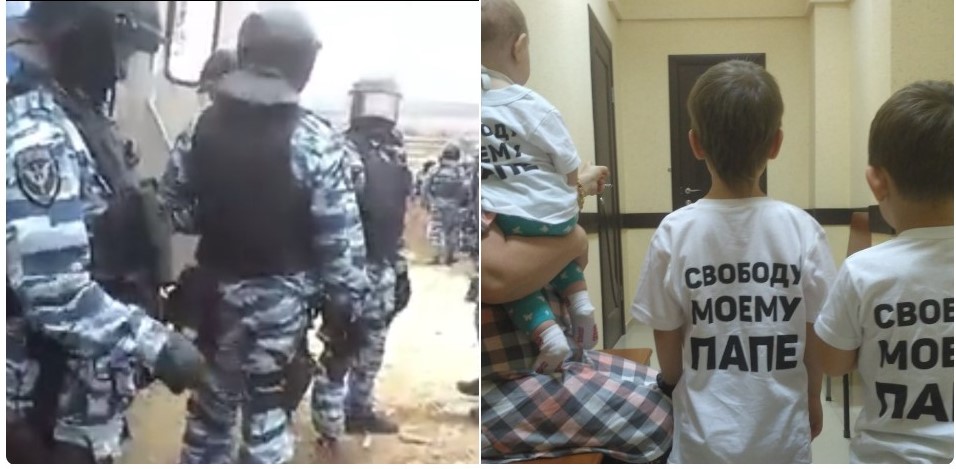• Topics / Human Rights Abuses in Russian-occupied Crimea
Lawyer: Sending Crimean political prisoners to Russia is a war crime

Five Ukrainian political prisoners from Crimea will shortly be taken against their will to Rostov in Russia for ‘trial’ with the conditions en route likely to be even worse than those in the Simferopol SIZO [remand prison] where they have been illegally held since October 2016. The fact that this is not the first time that Russia is so violating the Geneva Convention and other international agreements does not make it any the less serious, and human rights lawyer Emil Kurbedinov believes such behaviour should be viewed as a war crime.
The International Criminal Court’s Office of the Prosecutor determined back in 2016 that Russia’s occupation of Crimea constitutes an international armed conflict. Neither ICC, nor any other international body is in any doubt that Russia is an occupying power. As such, it must abide by the Geneva Convention relative to the Protection of Civilian Persons in Time of War which expressly prohibits occupying powers from carrying out “individual or mass forced transfers” or from imposing its legislation on the occupied territory. All five men: Teymur Abdullaev; Uzeir Abdullaev; Emil Dzhemadenov; Rustem Ismailov and Aider Saledinov are charged under Russian law with (unproven) involvement in an organization (Hizb ut-Tahrir) which is legal in Ukraine.
The transfer itself is also of concern since the conditions are shocking, and the men are held incommunicado. Kurbedinov also notes that because they are charged with ‘terrorism’, they get particularly rough treatment.
All the men have wives and children, have never had any trouble with the law and are devout Muslims. It was indeed noted at the time of their arrest on October 12, 2016 that the FSB appeared to have focused on men who had recently carried out the Haj to Mecca, a trip each Muslim must undertake at least once in their life.
The fact that the men are all law-abiding members of the community is only one of the reasons why Russian propaganda channels often use fake video footage in reporting such arrests. The other is that the charges themselves have nothing, but name, to link them with terrorism.
All are accused only in connection with the peaceful pan-Islamic organization Hizb ut-Tahrir which is legal in Ukraine and most countries, and which is not known to have carried out any acts of terrorism or violence anywhere in the world. The renowned Memorial Human Rights Centre considers all men convicted of such charges to be political prisoners, and it is likely that they will issue a statement shortly about the ‘Simferopol Five’. There is, after all, no need in such ‘trials’ of Crimean Muslims to await the (predetermined) verdicts given the additional illegality of Russia’s prosecution of Ukrainians from occupied Crimea.
These prosecutions have been referred to as a conveyor belt of repression in which one person is designated the role of ‘organizer’, with three or more men charged with ‘involvement’. In this case, Teymur Abdullaev is accused of being the ‘organizer’ of a Hizb ut-Tahrir ‘cell’ and under Article 205.5 § 1 could face up to life imprisonment. The other men are charged with involvement in this supposed ‘cell’ and could get 10-20 year sentences.
Russia imposes all kinds of restrictions on the lawyers revealing any details before the ‘trial’, however, judging by the two previous court imitations of a trial, the charges are likely to be based solely on secret witnesses and scraps of conversations on religious or political subjects ‘interpreted’ by obliging FSB ‘experts’ as indicating membership of Hizb ut-Tahrir.
All five men and their families were subjected to gratuitously violent armed searches in the early morning of 12 October, with small children awoken to see their fathers forced to the ground and then taken away in handcuffs. In at least the case of Teymur Abdullaev, he was also beaten by the men carrying out the search.
The two Abdullaev brothers seem to have received particularly brutal treatment, with Uzeir complaining of torture by the convoy officers bringing the men to ‘court’. It took a major effort to raise the alert internationally in April 2018 before Uzeir Abdullaev finally received even the minimum amount of treatment for severe blood poisoning. His mother, who is herself a doctor, believes that he did not, even then, receive sufficient treatment, and she is beside herself with worry about her sons as their forced transfer approaches.
The preliminary hearing is to take place in a Simferopol ‘court’ on 5 September, after which the men will be taken to Rostov.
Please help to publicise these cases where innocent men have been taken from their wives and children and face 20-year or life sentences on fabricated charges. Such bulk prosecutions, where proof is essentially not required, enable the FSB to flourish ‘good statistics on fighting terrorism’ and get bonuses or promotion (details here). In occupied Crimea, Russia is also using them as a means of intimidation and persecution, and is increasingly targeting men known for their civic activism, for example in Crimean Solidarity, an initiative helping political prisoners and their families, and publicising such cases of persecution.





